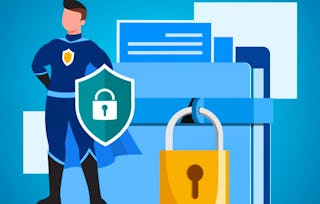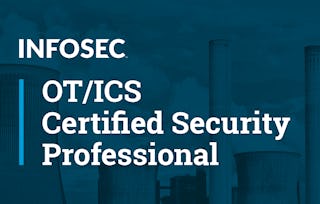The course "Artificial Intelligence Industrial Control Systems Security" explores the intersection of artificial intelligence (AI) and industrial control systems (ICS) security, focusing on the safety, trust, and privacy of AI technologies within critical infrastructures. Learners will gain a comprehensive understanding of the key cybersecurity challenges faced by ICS and the role AI can play in mitigating these risks. Through the exploration of large language models (LLMs), regulatory frameworks, and advanced ICS protocols, students will learn how to implement robust security measures for AI systems and industrial control environments.

Artificial Intelligence Industrial Control Systems Security
Seize the savings! Get 40% off 3 months of Coursera Plus and full access to thousands of courses.

Artificial Intelligence Industrial Control Systems Security
This course is part of Information Assurance Analysis Specialization

Instructor: Jason Crossland
Included with
Recommended experience
What you'll learn
Learn how to assess and address safety, privacy, and security concerns in AI systems and their impact on cybersecurity.
Understand the legal and policy frameworks surrounding AI technologies and their application in industrial settings.
Gain expertise in securing industrial control systems (ICS), including PLC, SCADA, and DCS, and mitigating their vulnerabilities.
Explore advanced ICS security strategies, focusing on risk assessment, incident response, and securing OT protocols and supply chains.
Skills you'll gain
Tools you'll learn
Details to know

Add to your LinkedIn profile
12 assignments
See how employees at top companies are mastering in-demand skills

Build your subject-matter expertise
- Learn new concepts from industry experts
- Gain a foundational understanding of a subject or tool
- Develop job-relevant skills with hands-on projects
- Earn a shareable career certificate

There are 5 modules in this course
This course provides a comprehensive exploration of the safety, cybersecurity, and privacy implications of AI systems and large language models (LLMs). Students will evaluate the accountability of AI under the law and investigate governance frameworks. The course also focuses on the security challenges specific to Operational Technology (OT) and Industrial Control Systems (ICS), highlighting key vulnerabilities and operational differences from IT. Practical skills in using tools like Wireshark for cybersecurity analysis and implementing protective measures for PLCs will be emphasized. Through discussions and hands-on activities, learners will gain a robust understanding of the complex interplay between technology, security, and regulatory requirements.
What's included
1 video2 readings
This module explores the safety and cybersecurity aspects of AI systems, focusing on evaluating their security, privacy, and autonomous concerns. It also covers the applicability and functionality of large language models (LLMs), including how algorithms and learning patterns enhance their performance.
What's included
5 readings3 assignments6 plugins
This module explores the legal accountability of AI systems, examining how they are regulated and governed. It covers human factors in computing systems and the policies that AI systems fall under. Students will assess how ChatGPT contributes to or detracts from value and analyze the impact of chatbots on large language models (LLMs).
What's included
3 readings3 assignments4 plugins
This course explores the Purdue Enterprise Reference Architecture Model and Unified Facilities Criteria, providing a framework for industrial control systems (ICS). It covers basic control systems like PLC, SCADA, and DCS, and examines the operational differences between IT and OT environments. Students will learn about key cybersecurity control elements to enhance ICS security, identify top vulnerabilities from a cyber perspective, and understand the usage and implementation of PLC application firewalls and software whitelisting.
What's included
4 readings3 assignments3 plugins
In this module, we will continue our discussion of Industrial Control System (ICS) networks. Specifically discussing what encompasses supply chain risks, Original Equipment Manufacturers/Vendors, and techniques for mitigating these risks. We will also discuss and examine several different types of ICS/OT protocols regarding their characteristics, purposes/implementations, the cybersecurity concerns with various OT proprietary and open protocols, and the differences between OT and IT environments.
What's included
3 readings3 assignments4 plugins
Earn a career certificate
Add this credential to your LinkedIn profile, resume, or CV. Share it on social media and in your performance review.
Instructor

Offered by
Explore more from Security
 Status: Free Trial
Status: Free Trial Status: Preview
Status: PreviewEdureka
 Status: Preview
Status: Preview
Why people choose Coursera for their career

Felipe M.

Jennifer J.

Larry W.

Chaitanya A.

Open new doors with Coursera Plus
Unlimited access to 10,000+ world-class courses, hands-on projects, and job-ready certificate programs - all included in your subscription
Advance your career with an online degree
Earn a degree from world-class universities - 100% online
Join over 3,400 global companies that choose Coursera for Business
Upskill your employees to excel in the digital economy
Frequently asked questions
To access the course materials, assignments and to earn a Certificate, you will need to purchase the Certificate experience when you enroll in a course. You can try a Free Trial instead, or apply for Financial Aid. The course may offer 'Full Course, No Certificate' instead. This option lets you see all course materials, submit required assessments, and get a final grade. This also means that you will not be able to purchase a Certificate experience.
When you enroll in the course, you get access to all of the courses in the Specialization, and you earn a certificate when you complete the work. Your electronic Certificate will be added to your Accomplishments page - from there, you can print your Certificate or add it to your LinkedIn profile.
Yes. In select learning programs, you can apply for financial aid or a scholarship if you can’t afford the enrollment fee. If fin aid or scholarship is available for your learning program selection, you’ll find a link to apply on the description page.
More questions
Financial aid available,


